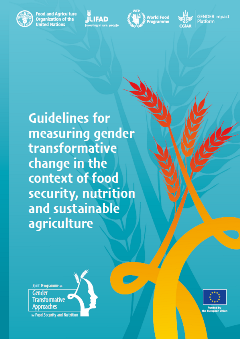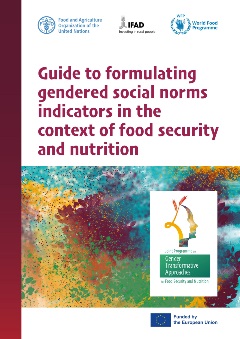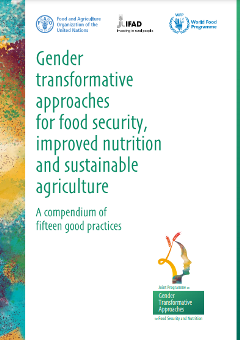
Launch Event: Guidelines for measuring gender transformative change in the context of food security, nutrition and sustainable agriculture
The "Guidelines for measuring gender transformative change in food security, nutrition and sustainable agriculture" were developed by the Joint Programme on Gender Transformative Approaches for Food Security and Nutrition (JP GTA) and the CGIAR GENDER Impact Platform with the aim of enhancing the capacity of research and development partners from the United Nations Rome-based Agencies (FAO, IFAD and WFP), the European Union, the CGIAR, and other organizations to design, implement, monitor and evaluate gender transformative interventions.
Join us for the virtual launch event to hear from the authors and thematic experts about the importance of including indicators capable of measuring gender transformative change in monitoring and evaluation frameworks of food security, nutrition and sustainable agriculture initiatives.
Event details
Tuesday, 26 September 2023 | 15:00-16:30 CET (Rome) | Zoom
The event will be conducted in English with simultaneous interpretation in French and Spanish.
Recordings
Agenda
Moderator: Elizabeth Burges-Sims, Deputy Director, Gender Equality Office, World Food Programme |
15:00 Setting the scene
|
15:10 Welcome remarks
|
15:20 Presentation of the Guidelines
|
15:40 Assessing normative constraints in agrifood systems: opportunities and challenges
|
16:00 Q&A
|
16:25 Closing remarks
|
Speakers
 Elizabeth Burges-Sims
Elizabeth Burges-Sims
Senior Gender Advisor, WFP
Moderator
Elizabeth (Liz) joined the WFP Gender Office in July 2021. Prior to this, she worked with the Asian Development Bank as the Gender Team Lead for Southeast Asia, at the Caribbean Development Bank as one of two Gender Specialists covering the full portfolio of projects, and with the Government of Canada where she held the positions of Senior Private Sector Development Specialist, Education Team Lead on diplomatic assignment to Mozambique, and Gender Team Lead for Sub-Saharan Africa. As Senior Gender Advisor, Liz will be heavily engaged in the development and implementation of WFP’s new ambitious gender policy, and in supporting technical units, Regional Bureaux and Country Offices to advance WFP’s commitments towards gender equality.
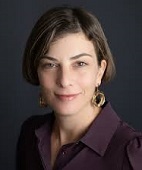
Lauren Phillips
Deputy Director, Inclusive Rural Transformation and Gender Equality Division, FAO
Lauren M. Phillips is the Deputy Director for the Inclusive Rural Transformation and Gender Equality Division at FAO. Prior to joining FAO, Phillips was a Senior Technical Specialist on Policy for IFAD. She was an Assistant Professor in the Department of International Relations at the London School of Economics from 2008 to 2014, and held a visiting post at Johns Hopkins School of Advanced International Studies in Bologna in 2014. Before this, she was a Research Fellow at the Overseas Development Institute. She also worked in private finance and with a major provider of political risk insurance. She started her career with the international NGO, Care. Phillips holds a Ph.D. in International Political Economy from the London School of Economics, a MA in International Policy Studies from Stanford University and a BA in International Relations and Latin American Studies (with honors) from Stanford University. She has published on issues related to the political economy of finance and development.
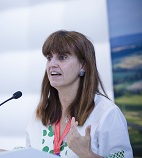
María Gafo Gómez-Zamalloa
Deputy Head of Unit “Social Sustainability”, Directorate-General for Agriculture and Rural Development, European Commission
María Gafo has a long experience in the European Commission where she has worked on energy, environment, forestry and agricultural policies. Some years ago, she coordinated the EU Forest Strategy and more recently the long-term vision for the EU Rural Areas. She is currently Deputy Head of Unit responsible for social sustainability in the European Commission's Directorate-General for Agriculture and Rural Development. Maria's Unit follow social issues in European rural areas, such as generational renewal, depopulation, equality, immigration or human rights. María holds a PhD in Forestry Engineering from the Polytechnic University of Madrid. She completed her studies at the Universities of Wageningen (The Netherlands) and Debrecen (Hungary). She also holds a diploma in European studies from the Spanish Diplomatic School. Before joining the European Commission, María was a consultant at Arthur Andersen-Garrigues and participated in several development projects in Mexico, Ecuador and Paraguay with the NGO "Solidarios para el Desarrollo".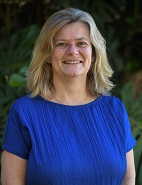
Nicoline de Haan
Platform Director, CGIAR GENDER Impact Platform
Nicoline de Haan is a senior researcher with more than 15 years of expertise in gender, rural livelihoods, agriculture, and natural resource management. She is presently the Director of the CGIAR GENDER Impact Platform. Previously, she served as the leader of the gender team at the International Livestock Research Institute (ILRI). Before ILRI, she led the work on gender, poverty and institutions under the CGIAR program on Water, Land and Ecosystems (WLE) examining the implications of inequity in access and control over natural resources, and finding options to ensure inclusive benefit sharing. In her previous position at FAO she led the global socio-economic team on animal health, where her main responsibility was reducing the impact of animal diseases on the livelihoods of smallholders, and especially women impacted by avian influenza. She holds a PhD in rural sociology from University of Missouri, Colombia, USA.
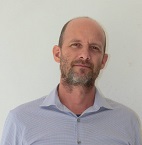
Steven Michael Cole
Senior Scientist and Gender Research Coordinator, IITA
Steven Michael Cole is a Senior Scientist and Gender Research Coordinator for the International Institute of Tropical Agriculture. He obtained his PhD in Biological Anthropology from the University of Arizona. He also holds a MSc degree in Agricultural and Resource Economics and a BSc in Health and Nutrition. His research employs both quantitative and qualitative methods to better understand the social and gender dynamics in agricultural contexts in low-income countries. He has extensive experience designing and piloting transformative approaches to overcome gender inequalities in agricultural development outcomes. His latest research integrates gender and other social science perspectives in biophysical research, including in research that aims to achieve gender-responsive breeding and seed systems outcomes and more inclusive value chains.
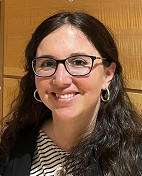
Mariola Acosta Frances
Rural Women's Empowerment Specialist, FAO
Mariola Acosta is a rural women’s empowerment specialist in the Gender Team of FAO. She holds a PhD on gender and agricultural development from Wageningen University in the Netherlands, an MSc. in Agricultural Development from the University of Copenhagen (Denmark), and a BSc. in Agricultural Engineering from the Polytechnic University of Valencia (Spain). She has over then years of work experience on gender equality and social inclusion in sustainable food systems, with a particular interest on the study of gendered social norms and structural barriers to women's empowerment. Before joining FAO, she worked at the Alliance of Bioversity International and CIAT, and at the International Institute of Tropical Agriculture (IITA), where she engaged with national and sub-national policy actors in Central America and East Africa in examining ways to improve the inclusion of gender issues in agriculture and climate change policies in the regions.
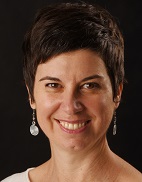
Els Lecoutere
Lead of the HER+ Gender Equality Initiative
Science Officer, CGIAR GENDER Impact Platform
Els Lecoutere is the Science Officer of the CGIAR GENDER Platform. In this role, she supports the Platform in strategically communicating high-quality evidence and to set high standards for gender research. In past roles, she has studied the way unequal access to resources and power relations, including those shaped by gender, define the efficiency and equity of outcomes within households and common pool resource systems in the context of low and middle income countries. She has assessed the impact of interventions or policy that aim to create more equal opportunities. Her research has been situated at the intersection of feminist economics, development studies, and development economics. Her background in development economics and demography, combined with a PhD of Political Sciences, has allowed her to approach her research in a multidisciplinary way, applying qualitative and quantitative methods, including field experiments and lab-in-the-field experiments. She was a Marie Skłodowska-Curie Fellow (2016-2018), participates in the Feminization in Agriculture initiative and was involved in research in the framework of the CGIAR Research Program on Climate Change, Agriculture and Food Security (CCAFS), Agriculture for Nutrition and Health (A4NH), and Policies, Institutions, and Markets (PIM).
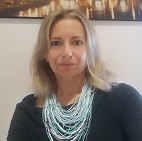
Silvia Sperandini
Gender and Social Inclusion Specialist, IFAD
Silvia Sperandini is the Gender, Targeting and Social Inclusion Specialist for the Gender Team at the International Fund for Agricultural Development (IFAD). She oversees the activities of the Desk in this domain and works to build knowledge about IFAD’s objectives and approaches on social targeting, gender equality and women’s empowerment; and their implementation through adequate capacity building, peer-support and knowledge sharing strategies. Before her 15 years with IFAD, Sperandini worked for other international organizations (like UNOPS-Dominican Republic and WFP-HQ) and Italian NGOs where she managed operations, partnership building and other project-related activities. Her academic background is in Political Science and International Affairs with a M.Sc. in International Co-Operation and Development Projects. She is an Italian expert of Development Cooperation and a lead-expert on the Communities of Practice approach.
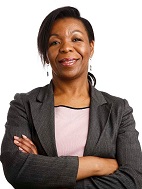 Ndaya Beltchika
Ndaya Beltchika
Lead Technical Specialist - Gender, Targeting and Social Inclusion, IFAD
Ndaya Beltchika is IFAD's Lead Technical Specialist - Gender, Targeting and Social Inclusion. Previously, Beltchika was Country Director in the West and Central Africa Division where she led the development of country strategies and provided oversight and coordinated programmes of loans and grants of Benin, Liberia and Sierra Leone. Prior to joining IFAD in 2010, Beltchika worked for over 25 years in private sector development, policy dialogue, rural development and rural finance. Earlier positions included Principal at ES&S Consulting, providing business strategy advice to small and medium private institutions; Senior Financial Analyst in corporate finance; advisor to the CFO and President of Institutional Sales at Fidelity Investments; and economist at Associates for International Resources and Development to support policy changes and development programmes in a number of WCA countries. Beltchika holds a Bachelor’s in Agronomy from La Faculté des Sciences Agronomique de l’Etat à Gembloux, Belgium, a Master’s in Agricultural Economics from the University of California at Davis, California, United States, and a Master’s in Business Administration from Babson College F. W. Olin Graduate School of Business, Massachusetts, United States.
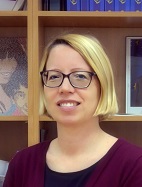
Katja Tiilikainen
Senior Adviser, Gender Equality, Ministry for Foreign Affairs of Finland
Lead of the EU Member States Working Group on the Gender Transformative Approach
Katja Tiilikainen is a Senior Advisor for Gender Equality in the Ministry for Foreign Affairs of Finland. Previously she has been working on gender equality and women’s rights at the Council of Europe Office in Ukraine, Embassy of Finland in Afghanistan and the United Nations Population Fund (UNFPA). She has also worked in the Delegation of the European Commission in Costa Rica. She has a M.A in French Philology and a M. Soc. Sci in political sciences from the University of Helsinki, Finland.
Related content
The EU-RBA Joint Programme on Gender Transformative Approaches for Food Security and Nutrition (JP GTA) is implemented by the three United Nations Rome-based Agencies – FAO, IFAD and WFP – in collaboration with and through financial support from the European Union.





